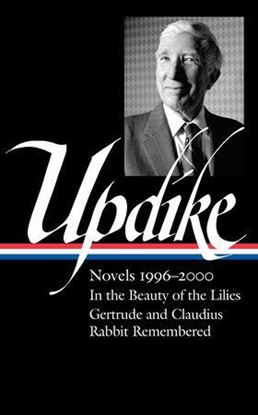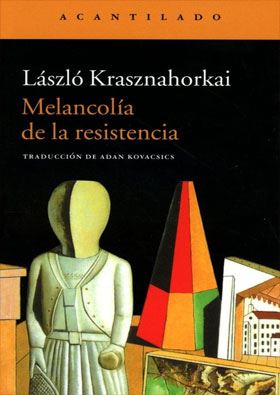

UPDIKE: NOVELS 1996–2000
The capstone volume of the Library of America edition of John Updike’s novels contains some of the master stylist and social observer’s most ambitious works.
In the Beauty of the Lilies (1996) opens in 1910, when Clarence Wilmot, a Presbyterian minister in Paterson, NJ, experiences a devastating loss of faith. This moment of crisis sets in motion an eighty-year, multigenerational saga whose subject is nothing less than the American Century and modernity itself, seen through the fluctuating fortunes of a single representative family.
In Gertrude and Claudius, Updike boldly imagines the long backstory to the world’s most famous play, prompting readers to revisit and perhaps revise their judgments about Hamlet’s notorious uncle and mother. Drawing on the twelfth- and fifteenth century sources for Hamlet, but also inventing a new history for Claudius in his far-flung travels across medieval Europe, Updike creates a vivid and surprising origin story for the fabled rottenness in Shakespeare’s Denmark.
1,750
URSUA (TRILOGIA NUEVO MUNDO 1) (TB)
La extraordinaria primera parte de William Ospina sobre la conquista del Nuevo Mundo.
En 1543, con solo dieciséis años, deseoso de fortuna y aventuras guerreras, el joven Pedro de Ursúa viaja al Nuevo Mundo. Desembarca en Perú, confiando en que la tierra de los incas le depare, como a tantos hasta entonces, riqueza y poder; sin embargo, se encuentra con una región turbulenta, dividida entre bandos de conquistadores tan apegados a sus nuevas rapiñas que recelan de cualquier recién llegado. La llegada de su tío Miguel Díaz de Armendáriz a Cartagena lo libra de este panorama sin promesas, y bajo su padrinazgo comienza una larga y codiciosa carrera de conquista, y después, libre de disposiciones oficiales, se entrega a sus sueños de riqueza y de gloria.
Con todas las contradicciones de los grandes hombres -cruel y compasivo, audaz y conservador, obediente e indócil, enamorado y misógino-, Pedro de Ursúa es el resumen de las violentas pasiones que asolaron las Indias Occidentales.
«Ahora había un destino a la medida de la ambición de Pedro de Ursúa, y a partir del momento en que tuvo noción del rumbo del tesoro, ya no le interesaron los asuntos de la gobernación. Creo que revela cuán joven era, esa capacidad de abandonar un capricho y dedicarse a otro con la misma ceguera y la misma pasión.»
1,350
V13
La crónica, descarnada y humana, del proceso judicial por el atentado yihadista contra la sala Bataclan.
V13: viernes 13 de noviembre de 2015. En tres puntos diferentes de París se producen atentados yihadistas. El más grave es el de la sala Bataclan, donde están actuando los Eagles of Death Metal. El resultado de los ataques en el corazón de Francia es de ciento treinta muertos y más de cuatrocientos heridos. Años después, durante nueve meses –entre septiembre de 2021 y junio de 2022–, se celebra el juicio en el Palacio de Justicia de la capital. Hay catorce acusados: el principal es el único superviviente de entre los terroristas de Estado Islámico que participaron en la masacre. Sobrevivió porque no detonó su cinturón con explosivos. ¿Falló el mecanismo? ¿Tuvo miedo? ¿O quizá un fugaz momento de arrepentimiento y humanidad? El resto son colaboradores en distintos grados. Y además están los testigos –que cuentan historias de una gran crudeza–, los familiares de los fallecidos, los severos fiscales, los abogados defensores, que utilizan argucias para tratar de salvar a sus clientes, el tribunal, que debe emitir sentencia… La justicia evalúa con frialdad la barbarie.
1,350
V2
Noviembre de 1944. Rudi Graf es un ingeniero alemán que soñaba con enviar cohetes a la luna, al que la guerra ha llevado hasta una pequeña localidad de la costa de Holanda. Allí colabora con Wernher von Braun en el lanzamiento de los cohetes V2 que están destruyendo la capital británica.
Kay Caton-Walsh es una joven oficial que trabaja para el gobierno británico descifrando imágenes aéreas. Tras sobrevivir al ataque de un V2 mientras se encontraba con su amante en una habitación de hotel, se presenta voluntaria para una misión secreta. En Bélgica, recién liberada de la ocupación alemana, se va a montar un operativo para tratar de averiguar la ubicación desde donde se envían los cohetes. Armadas con una regla de cálculo y algunas ecuaciones, Kay y sus compañeras están decididas a localizar y destruir las lanzaderas de los misiles.
995
V2 (BOL)
Rudi Graf es un ingeniero alemán que soñaba con enviar cohetes a la luna, al que la guerra ha llevado hasta una pequeña localidad de la costa de Holanda. Allí colabora con Wernher von Braun en el lanzamiento de los cohetes V2 que están destruyendo la capital británica.
Kay Caton-Walsh es una joven oficial que trabaja para el gobierno británico descifrando imágenes aéreas. Tras sobrevivir al ataque de un V2 mientras se encontraba con su amante en una habitación de hotel, se presenta voluntaria para una misión secreta. En Bélgica, recién liberada de la ocupación alemana, se va a montar un operativo para tratar de averiguar la ubicación desde donde se envían los cohetes. Armadas con una regla de cálculo y algunas ecuaciones, Kay y sus compañeras están decididas a localizar y destruir las lanzaderas de los misiles.
900
VAIM
A bordo de su barco Eline, Jatgeir llega a Bjørgvin desde Vaim, la pequeña ciudad donde vive. Necesita comprar hilo y aguja para coser un botón, pero en las tiendas le piden un precio exorbitante y es doblemente estafado. Antes de volver a casa con las manos vacías, fondea en una aldea de pescadores para dormir en su barco, pero una voz familiar lo despierta en medio de la noche: es Eline, su gran amor de juventud, que ha dejado a su marido, Frank, y quiere regresar a Vaim con él.
Vaim es la primera novela escrita por Fosse después de haber recibido el Premio Nobel de Literatura en 2023, y también el primer volumen de un tríptico sobre la ciudad ficticia de Vaim. Es una novela de amor, muerte y triángulos amorosos en continuo movimiento, de barcos pesqueros y de hombres que aceptan las reglas que impone una mujer dueña de una fuerte y rara determinación.
1,350














